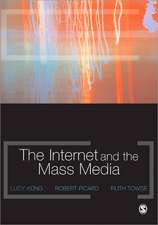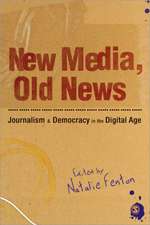Communicating for Managerial Effectiveness: Challenges | Strategies | Solutions
Autor Phillip G. Clampitten Limba Engleză Paperback – 10 ian 2017
Preț: 916.26 lei
Preț vechi: 1255.16 lei
-27% Nou
Puncte Express: 1374
Preț estimativ în valută:
175.38€ • 190.57$ • 147.42£
175.38€ • 190.57$ • 147.42£
Carte tipărită la comandă
Livrare economică 21 aprilie-05 mai
Preluare comenzi: 021 569.72.76
Specificații
ISBN-13: 9781483358512
ISBN-10: 1483358518
Pagini: 384
Dimensiuni: 178 x 254 x 15 mm
Greutate: 0.59 kg
Ediția:Sixth Edition
Editura: SAGE Publications
Colecția Sage Publications, Inc
Locul publicării:Thousand Oaks, United States
ISBN-10: 1483358518
Pagini: 384
Dimensiuni: 178 x 254 x 15 mm
Greutate: 0.59 kg
Ediția:Sixth Edition
Editura: SAGE Publications
Colecția Sage Publications, Inc
Locul publicării:Thousand Oaks, United States
Recenzii
"The best practical guide available for integrating complexity into effective managerial practice. Clampitt’s unique, up-to-the-minute, and leading-edge focus on communication practices give managers an essential set of skills for effectively navigating today¹s most difficult complex organizational problems. Communicating for Managerial Effectiveness identifies a common set of complex problems all managers face and details specific communication-enhanced strategies and tactics for moving past those problems toward successful solutions. Advanced undergraduate and MBA students especially resonate with Clampitt’s practice-tested and strategically focused methods for action."
“This is a comprehensive text that addresses communication from a multidisciplinary approach and reflects contemporary management practice.”
“Phil Clampitt takes the mystery out of understanding managerial communications. His engaging style of presenting important communication concepts has my students reading beyond their assignments. Prompting students to discuss the text in class has never been easier.”
“I have been searching for a text I could use that presented clear, skill-based, practical suggestions my students could implement in the business world along with a theoretical background that would provide a depth of understanding as to why those skills are successful. This textbook does just that. It is a terrific blend of theory, skills and provides real business-based practicum and analysis assignments for the students to apply what they learned in each chapter.”
“This is an excellent text to use for students seeking a degree in Organizational Leadership because it addresses more of the communication challenges that leaders face (e.g. performance feedback discussions, communicating about organizational change).”
“This book is one of the few which is a 'must read' in the field of management communication. Phil Clampitt combines a deep understanding of the research with an unparalleled sensitivity to the needs of practitioners. He has produced a text which is stimulating, fun to read and which transforms the way in which we think about communication in organizations. Wise executives will study its pages in order to steal ideas about best practice from one of the best in the business. The winners will be the organizations they work for. The losers will be the competition.”
“This text is a treasure trove for us in and out of the classroom.”
“This is a comprehensive text that addresses communication from a multidisciplinary approach and reflects contemporary management practice.”
“Phil Clampitt takes the mystery out of understanding managerial communications. His engaging style of presenting important communication concepts has my students reading beyond their assignments. Prompting students to discuss the text in class has never been easier.”
“I have been searching for a text I could use that presented clear, skill-based, practical suggestions my students could implement in the business world along with a theoretical background that would provide a depth of understanding as to why those skills are successful. This textbook does just that. It is a terrific blend of theory, skills and provides real business-based practicum and analysis assignments for the students to apply what they learned in each chapter.”
“This is an excellent text to use for students seeking a degree in Organizational Leadership because it addresses more of the communication challenges that leaders face (e.g. performance feedback discussions, communicating about organizational change).”
“This book is one of the few which is a 'must read' in the field of management communication. Phil Clampitt combines a deep understanding of the research with an unparalleled sensitivity to the needs of practitioners. He has produced a text which is stimulating, fun to read and which transforms the way in which we think about communication in organizations. Wise executives will study its pages in order to steal ideas about best practice from one of the best in the business. The winners will be the organizations they work for. The losers will be the competition.”
“This text is a treasure trove for us in and out of the classroom.”
Cuprins
Foreword
Preface
Introduction
SECTION 1. FOUNDATION
Chapter 1. Understanding Communication
Propositions
Implications of the Propositions
Conclusion
Key Concepts
“Drill Down” Exercises
Chapter 2. Examining Communication Approaches
The Arrow Approach
The Circuit Approach
Communication as Dance
Conclusion
Key Concepts
“Drill Down” Exercises
Chapter 3. Scrutinizing Ethical Issues
Fundamental Assumptions
Ethical Dilemmas
A Strategic Approach to Corporate Ethics
Conclusion
Key Concepts
“Drill Down” Exercises
Chapter 4. Imparting the Organizational Culture
What Is Culture?
Does Culture Matter?
How Can We Discover Culture?
How Can We Evaluate Culture?
How Can Leaders Effectively Impart the Culture?
Conclusion
Key Concepts
“Drill Down” Exercises
SECTION 2. COMMUNICATION CHALLENGES
Chapter 5. Selecting and Using Communication Technologies
The B - C Model: A Deeper Look
How Perspective Affects Value
What to Do?
Conclusion
Key Concepts
“Drill Down” Exercises
Chapter 6. Managing Data, Information, Knowledge, and Action
The D-I-K-A Model
Variations of the Model
Managing the Data–Information Relationship
Managing the Information–Knowledge Relationship
Managing the Knowledge–Action Relationship
Conclusion
Key Concepts
“Drill Down” Exercises
Chapter 7. Providing Performance Feedback
Performance Feedback Principles
Implementing a Successful Feedback System
Communicating Performance Feedback
Conclusion
Key Concepts
“Drill Down” Exercises
Chapter 8. Communicating across Organizational Boundaries
The Nature of Boundaries
Potential Problems of Boundaries
Contributing Factors
What to Do?
Conclusion
Key Concepts
“Drill Down” Exercises
Chapter 9. Structuring and Using Robust Decision-Making Practices
Decision-Making Tensions
Pre-Decision-Making Checklist
The Robust Decision-Making Model
Strategies for Optimizing the Decision-Making Process
Conclusion
Key Concepts
“Drill Down” Exercises
Chapter 10. Communicating about Change
Approaches to Change
Selecting the Degree of Communication
Reactions to Change
The “Iceberg” Model
Conclusion
Key Concepts
“Drill Down” Exercises
Chapter 11. Cultivating the Innovative Spirit
Misconceptions
What Is Innovation?
A Perspective on Success and Failure
Strategic Traffic Signals
Conclusion
Key Concepts
“Drill Down” Exercises
Chapter 12. Building a World-Class Communication System
Assess
Strategize
Implement
The Assess–Strategize–Implement Cycle in Action
Conclusion
Key Concepts
“Drill Down” Exercises
Glossary
Notes
Index
About the Author
Preface
Introduction
SECTION 1. FOUNDATION
Chapter 1. Understanding Communication
Propositions
Implications of the Propositions
Conclusion
Key Concepts
“Drill Down” Exercises
Chapter 2. Examining Communication Approaches
The Arrow Approach
The Circuit Approach
Communication as Dance
Conclusion
Key Concepts
“Drill Down” Exercises
Chapter 3. Scrutinizing Ethical Issues
Fundamental Assumptions
Ethical Dilemmas
A Strategic Approach to Corporate Ethics
Conclusion
Key Concepts
“Drill Down” Exercises
Chapter 4. Imparting the Organizational Culture
What Is Culture?
Does Culture Matter?
How Can We Discover Culture?
How Can We Evaluate Culture?
How Can Leaders Effectively Impart the Culture?
Conclusion
Key Concepts
“Drill Down” Exercises
SECTION 2. COMMUNICATION CHALLENGES
Chapter 5. Selecting and Using Communication Technologies
The B - C Model: A Deeper Look
How Perspective Affects Value
What to Do?
Conclusion
Key Concepts
“Drill Down” Exercises
Chapter 6. Managing Data, Information, Knowledge, and Action
The D-I-K-A Model
Variations of the Model
Managing the Data–Information Relationship
Managing the Information–Knowledge Relationship
Managing the Knowledge–Action Relationship
Conclusion
Key Concepts
“Drill Down” Exercises
Chapter 7. Providing Performance Feedback
Performance Feedback Principles
Implementing a Successful Feedback System
Communicating Performance Feedback
Conclusion
Key Concepts
“Drill Down” Exercises
Chapter 8. Communicating across Organizational Boundaries
The Nature of Boundaries
Potential Problems of Boundaries
Contributing Factors
What to Do?
Conclusion
Key Concepts
“Drill Down” Exercises
Chapter 9. Structuring and Using Robust Decision-Making Practices
Decision-Making Tensions
Pre-Decision-Making Checklist
The Robust Decision-Making Model
Strategies for Optimizing the Decision-Making Process
Conclusion
Key Concepts
“Drill Down” Exercises
Chapter 10. Communicating about Change
Approaches to Change
Selecting the Degree of Communication
Reactions to Change
The “Iceberg” Model
Conclusion
Key Concepts
“Drill Down” Exercises
Chapter 11. Cultivating the Innovative Spirit
Misconceptions
What Is Innovation?
A Perspective on Success and Failure
Strategic Traffic Signals
Conclusion
Key Concepts
“Drill Down” Exercises
Chapter 12. Building a World-Class Communication System
Assess
Strategize
Implement
The Assess–Strategize–Implement Cycle in Action
Conclusion
Key Concepts
“Drill Down” Exercises
Glossary
Notes
Index
About the Author
Notă biografică
Descriere
This book equips students, managers, and executives with the strategies and tools to address common communication problems experienced in organisations, with the goal of learning how to add value to their organisations by communicating more effectively.











